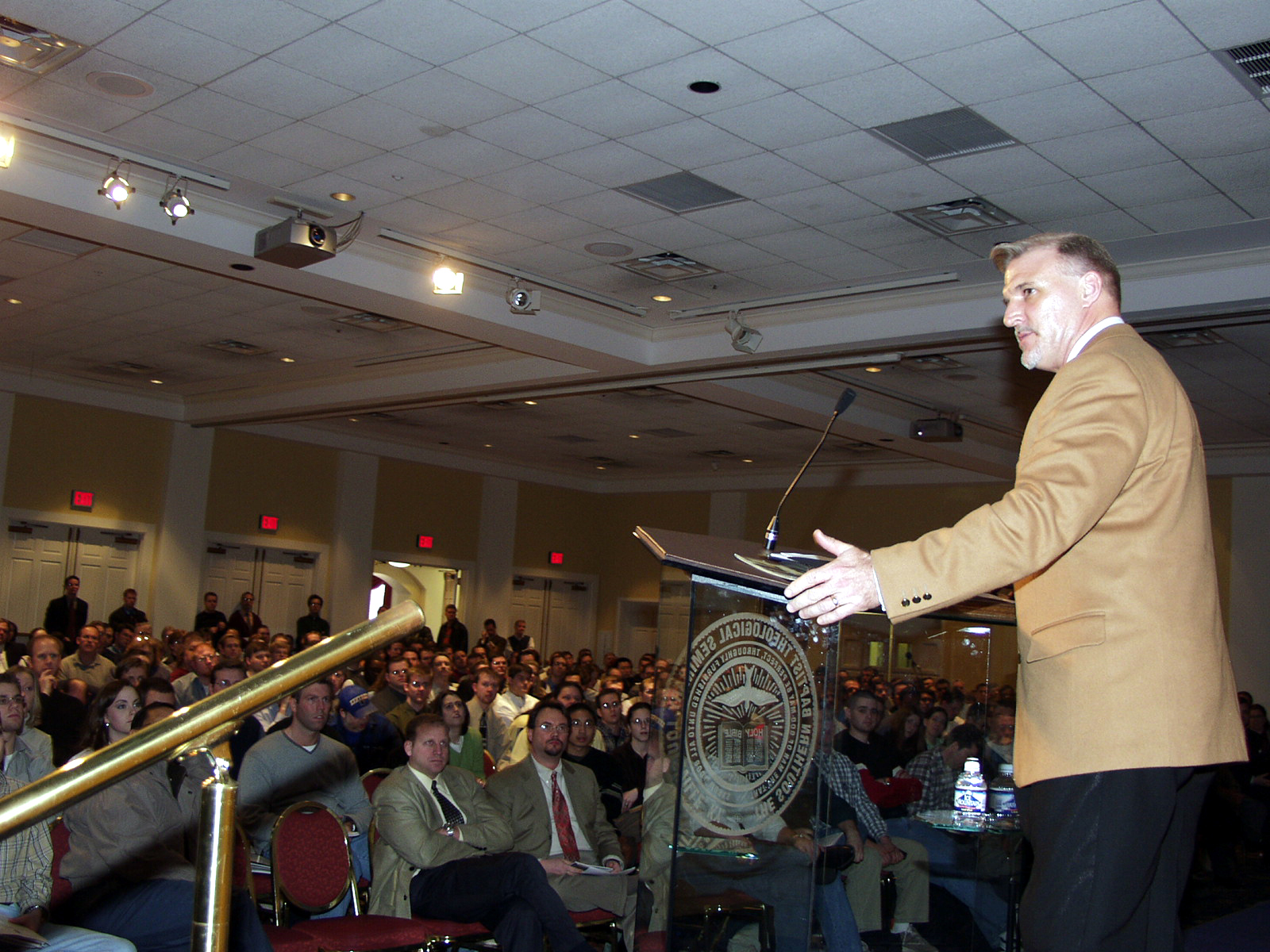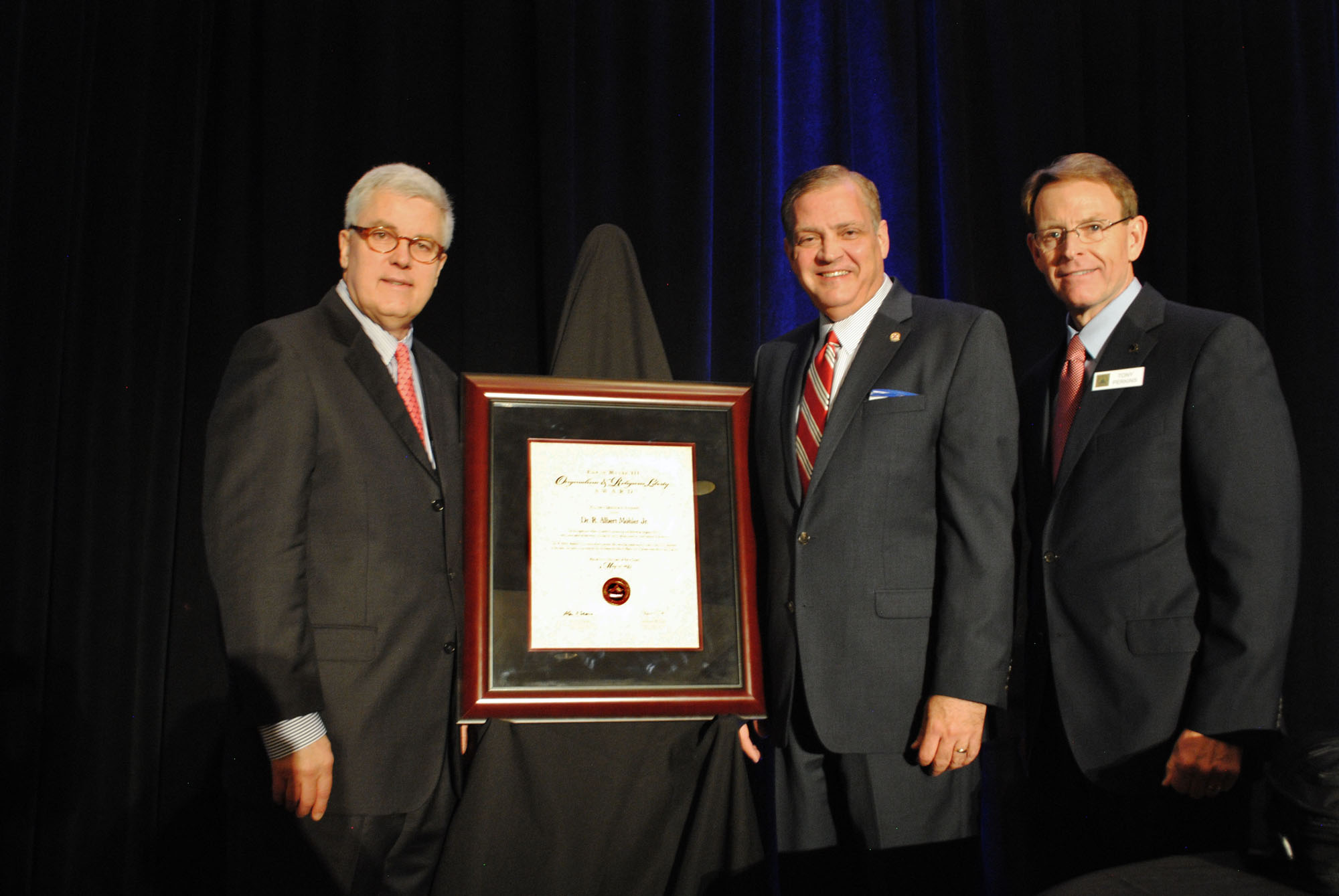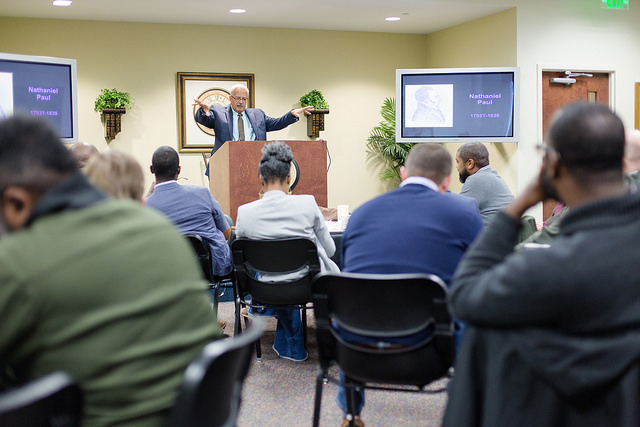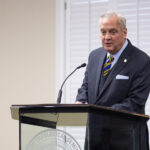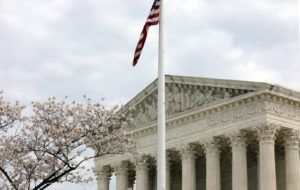
LOUISVILLE, Ky. (BP)–The Christian church must repent of its past attitude toward homosexuals while at the same time taking the gospel to them, said author and speaker Joe Dallas.
Dallas appeared at Southern Baptist Theological Seminary with a team from Focus on the Family as part of a daylong March 5 presentation by the Colorado-based ministry. The team briefed the Louisville, Ky., seminary community on current issues related to homosexuality, with an aim toward formulating a biblical response.
A former homosexual and gay activist, Dallas now works with men and women struggling to leave the homosexual lifestyle. He is the author of two books and served as president of Exodus International — a Christian organization that ministers to homosexuals — from 1990-93.
“It’s an issue that I’m glad to see that we are addressing in the churches,” he said of homosexuality. “It was not always so. In the not so distant past the subject was virtually unmentionable in Christian company. Very few subjects provoke the level of offense, emotion, controversy that this subject entails.
“[But] sometimes the body of Christ has a mandate to be controversial for the sake of the truth.”
Dallas said the Christian church must:
— Repent of its own immorality.
Before the church calls others to holiness, it must first repent of the immorality within its own body, Dallas said.
“I believe God would call his people to repent of whatever immorality exists within our own walls and recommit ourselves to biblical standards of holiness,” he said.
Dallas quoted research by George Barna, which found the rate of divorce among Christians equal to the rate among non-Christians. Dallas also quoted a statistic from Christianity Today that three of 10 pastors interviewed had viewed pornography.
“You see that it becomes ironic when we ask ourselves, ‘What can we do about the moral condition of the culture?'” he said. “Perhaps more relevant: What can we do about the moral condition of the church? Until we address the moral condition of the church, how we can we hope to address the moral condition of the culture?”
Dallas said there is a lack of authenticity within the church.
“We seem unable or unwilling to admit that we too are sexual creatures who struggle with temptations toward sexual sin – the inevitable result of living in a sexually idolatrous culture,” he said.
He made a distinction between sexual transgression and sexual struggle.
“A sexual transgression — a willful act of disobedience — must be addressed sternly within the church, and church discipline is in order,” he said. “Sexual struggle is another matter. To some extent, most of us experience it. Too often … we see tragic results because what is unconfessed and undealt with eventually becomes a bondage that overtakes a man.”
Church members should hold one another accountable while also confessing their sin, Dallas said.
“There, I think, we can fulfill James’ admonition – ‘Confess your faults one to another and pray for one another that you might be healed.’
“With that model of vulnerability and accountability, I believe we would have something credible to present to the culture in which we could say, ‘Yes, we know. It is difficult to struggle with your sexuality, but by the grace of God and by biblical principles of accountability, vulnerability and discipline, we are able to do it. We invite you to do the same.'”
— Repent of hostility toward homosexuals.
Too many Christians have what Dallas called the “Jonah Syndrome.” He drew a parallel between some Christians and the biblical character of Jonah who called for the citizens of Nineveh to repent of their sin. When they did repent, Jonah was angry that God did not destroy the city.
“The Jonah Syndrome shows itself when homosexuals are no longer people to us but instead a problem to be solved, an agenda to be resisted, the enemy,” he said.
The Jonah Syndrome, he said, was prevalent in the 1980s when AIDS was spreading through the homosexual community.
“There, more than ever, was a great opportunity for the body of Christ to move in and say, ‘My gosh, what can we do for you? This is tragic. You need food, you need clothing? You need medical care? You need an answer to your fear of death? Provision has been made on the cross. Let us explain that to you,'” Dallas said.
The Jonah Syndrome also emerged in the 1990s, when more effort was spent on defeating homosexual political causes than winning souls in the gay community, Dallas said.
“We were willing to spend millions of dollars to defeat gay political causes, and I am glad,” he said. “Frankly, I think we need more. But simultaneously, we could barely squeeze out pennies to support organizations that sought to evangelize and provide healing for homosexual people. The imbalance spoke for itself. …
“There are more important things than defeating the gay agenda. There are the souls of the people we oppose. Jesus said, ‘My kingdom is not of this world.’ When our political ideology – as important as it is – overrides eternal principles, then our priorities are skewed and we must repent.”
— Repent of being intimidated by the homosexual rights movement.
Quoting Martin Luther King Jr., Dallas said the church is the “conscience of the state.”
“Should the body of Christ allow herself to be silenced on this or any social issue, then the state has no hope but to become a sociopathic state, and the conscience of the state will have failed,” Dallas said.
The church must continue speaking out because the homosexual rights movement wants all opposition silenced, he said.
“It is not a stretch to say that the most frightening element of the gay rights movement is not its celebration of sexual perversion, but rather it its commitment to silencing all opposing voices – particularly the voices that come from within the body of Christ,” he said.
“The movement that has adopted the slogan, ‘celebrate diversity,’ has simultaneously adopted the tactic that says, ‘Crush the opposition.'”
Dallas mentioned several prominent examples, including homosexual activists’ opposition to Laura Schlessenger’s television talk show and the Boy Scouts’ policy of not allowing homosexual leaders.
“Check any area where the gay rights area has gained a significant foothold and influences the cultural structures of government and education and entertainment,” he said. “… Simultaneously with gay ascension you will find severe restrictions on three primary freedoms we celebrate: freedom of speech, freedom of conscience [and] freedom of religion”
That attempt to silence the opposition, Dallas said, could work in conservatives’ favor.
“Perhaps our public has largely gone pro-homosexual in its ideology, but Americans still hate hypocrisy and they still hate oppression,” he said.
Christians could become involved by writing letters to the editor and calling radio talk shows when homosexuality is the topic. Christians, however, should practice what Dallas called “bold love.”
“Bold love is not wimpy,” he said. “Bold love is not compromised. In fact, bold love seeks to serve without compromising. Bold love is angry. There is a time for anger, and if we’re not angry now we are blind.”
Bold love, he said, is angry at the “sinful state and not the sinner.”
“Half the message is that homosexuality is part of the human problem,” Dallas said. “The whole message is that there is a remedy in the cross.”
–30–
(BP) photo posted in the BP Photo Library at https://www.bpnews.net. Photo title: HOMOSEXUALITY AT ISSUE.
